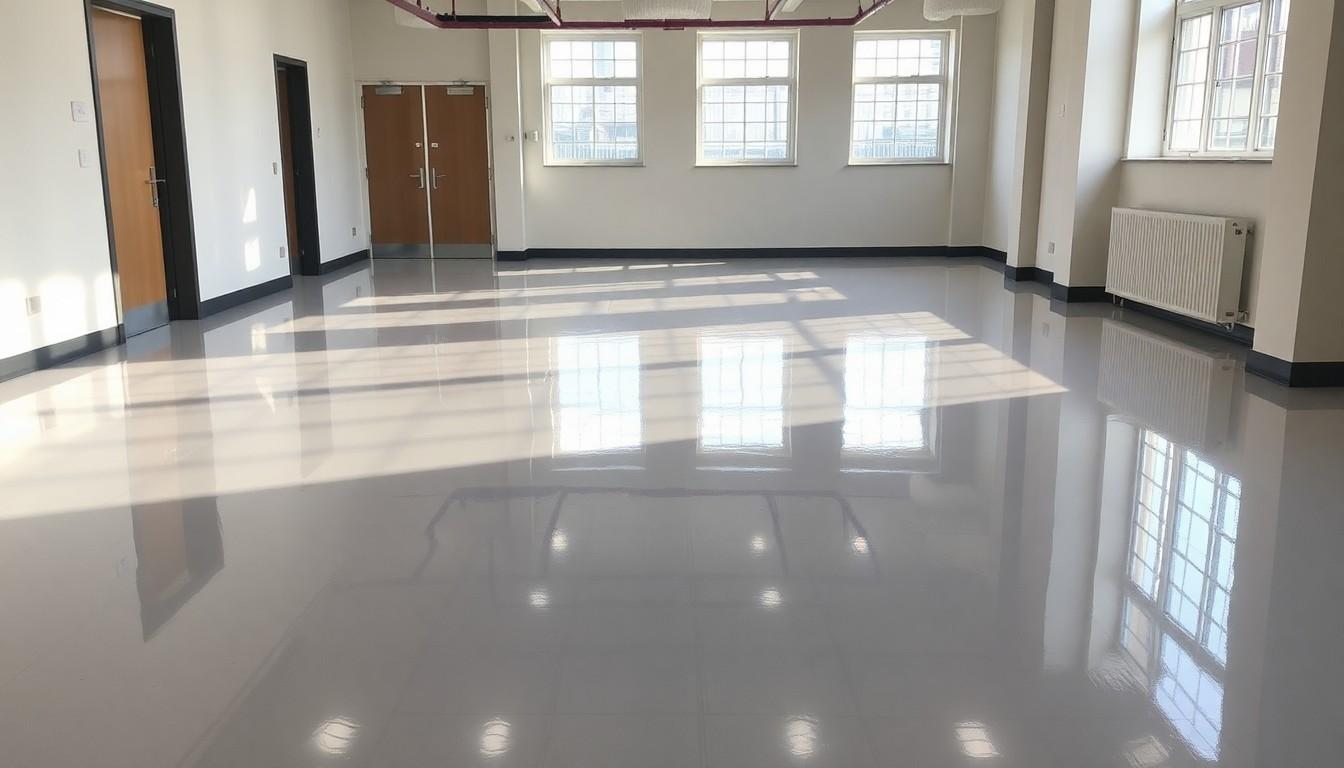The post Transform Your London Property with Premium Epoxy Flooring Solutions | Expert Installation appeared first on UK Construction Blog.
Key Takeaways
- Epoxy flooring offers exceptional durability for London properties, withstanding heavy foot traffic, chemical spills, and daily wear in both commercial and residential settings
- Professional installation is crucial for quality results, with proper surface preparation, application techniques, and appropriate curing time ensuring long-lasting performance
- Cost factors include material quality (£25-£150/m²), labour (£250-£350/day), and surface preparation (£15-£30/m²), though the long-term value offsets initial investment
- The waterproof properties make epoxy flooring ideal for London’s damp climate, protecting underlying concrete from moisture damage common in the UK
- Available in various types including standard systems, high-build coatings, and decorative options with metallic finishes and flake systems for customised aesthetics
- Minimal maintenance requirements (regular sweeping and occasional mopping with pH-neutral cleaners) make epoxy particularly suitable for London’s urban environment
Looking to transform your drab London garage or commercial space into a sleek, durable environment? Epoxy flooring represents the pinnacle of floor enhancement in the UK capital, offering unmatched protection against stains, cracks and everyday wear. With its high-gloss finish and exceptional longevity, it’s become the preferred choice for discerning property owners across London.
What sets epoxy resin flooring apart is its remarkable versatility. Available in numerous designs, colours and textures, you can customise your space to reflect your unique aesthetic preferences while enjoying the practical benefits of easy maintenance and superior resilience. Whether for automotive facilities, healthcare environments or residential garages, epoxy flooring delivers a seamless, professional finish that stands the test of time.
Understanding Epoxy Flooring: A Perfect Solution for London Properties
Epoxy flooring delivers exceptional durability and protection for London properties, making it an ideal choice for both residential and commercial spaces. The unique combination of epoxy resin and hardener creates a robust surface that withstands the demands of London’s busy lifestyle.
What Makes Epoxy Flooring Special?
Epoxy flooring consists of two primary components: epoxy resin and a hardener. When mixed, these elements form a chemical bond that results in a tough, high-performance surface. The high-gloss finish provides London properties with a modern, sleek appearance that transforms ordinary floors into striking features.
Unlike traditional flooring options, epoxy creates a seamless surface without joints or gaps, making it exceptionally easy to clean and maintain. This seamless quality is particularly valuable in London’s urban environment where dust and grime are common challenges for property owners.
Benefits for London Commercial Properties
London businesses benefit significantly from epoxy flooring installations. The exceptional durability withstands heavy foot traffic in busy commercial areas like Oxford Street and Islington, where conventional concrete floors quickly become scuffed and damaged.
Epoxy floors offer superior slip resistance, creating safer environments for both customers and staff. This safety feature is particularly important in London’s often damp climate. Commercial establishments such as:
- Retail shops and showrooms benefit from the professional, high-gloss finish
- Warehouses appreciate the floor’s resistance to heavy machinery and equipment
- Laboratories value the chemical resistance properties
- Automotive facilities rely on epoxy’s ability to withstand oil and chemical spills
Residential Applications in London Homes
London homeowners increasingly choose epoxy flooring for various areas of their homes. Garage floors transformed with epoxy gain protection from oil stains, tyre marks, and the general wear associated with vehicle storage and home workshop activities.
The customisation options allow you to match your home’s aesthetic perfectly, with various colours and finishes available. London properties benefit from the waterproof nature of epoxy flooring, protecting underlying concrete from moisture damage that’s common in the UK climate.
Basement areas, particularly prone to dampness in London’s older properties, gain valuable protection from moisture with proper epoxy installations. The reflective properties of high-gloss epoxy finishes also help brighten spaces by maximising available light, a valuable benefit in London’s characteristic grey weather.
Installation Considerations for London Properties
Professional installation ensures the best results for London properties. The application process requires proper surface preparation, with thorough cleaning and sometimes grinding of the existing concrete surface. Temperature and humidity levels, which fluctuate significantly in London’s climate, must be carefully monitored during installation.
The curing time typically ranges from 24-72 hours, depending on specific environmental conditions. London’s older properties often present unique challenges that experienced installers can address, including uneven surfaces and existing floor damage.
With professional application, epoxy flooring provides London property owners with a long-lasting, attractive, and practical flooring solution that stands up to the demands of city living while enhancing property value.
Types of Epoxy Flooring Available in London
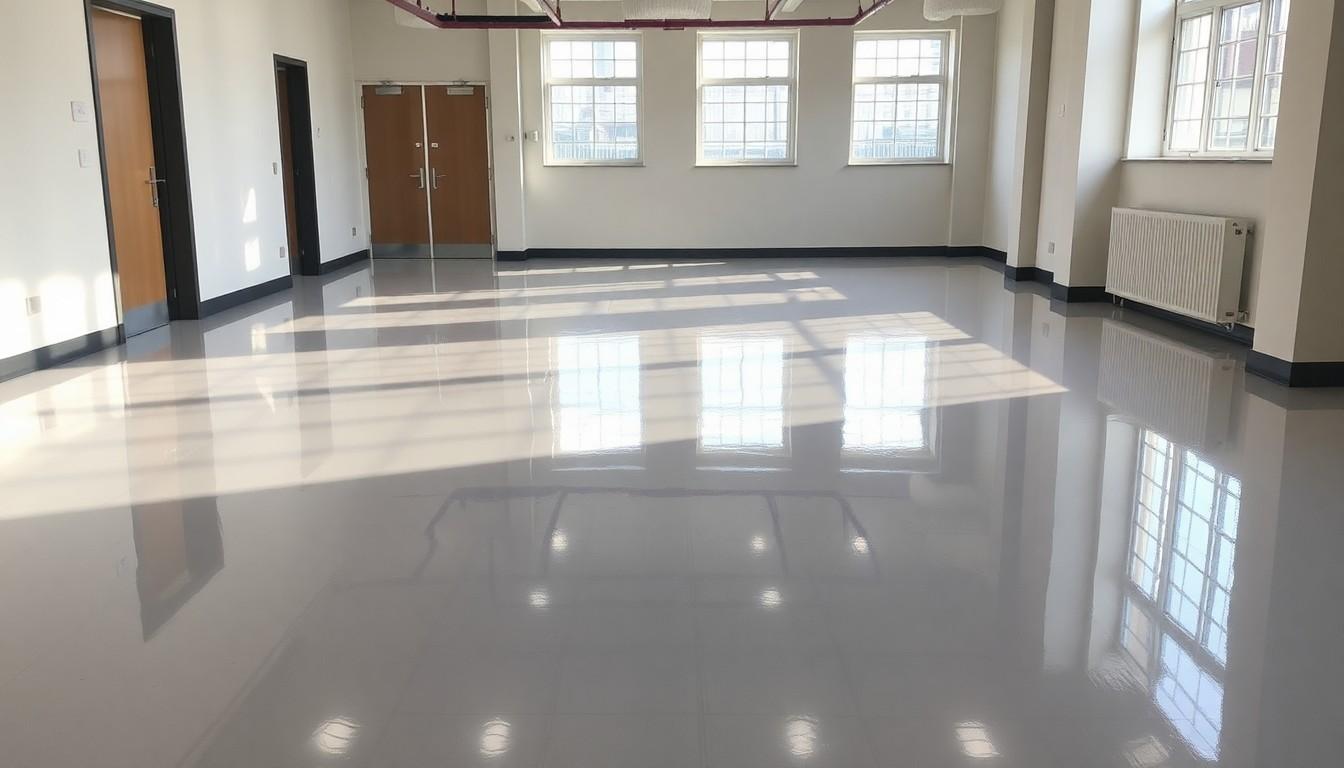
Epoxy flooring is a popular choice in London due to its durability, versatility, and aesthetic appeal. Commercial and residential property owners throughout the capital choose from several distinct epoxy flooring options, each offering unique benefits for different applications.
Standard Epoxy Systems
Standard epoxy systems represent the most common type of resin flooring installed across London. This system consists of two main components: epoxy resin and a hardener, which combine to form a durable and chemically resistant surface. The high-gloss finish, excellent abrasion resistance, and seamless appearance make standard epoxy systems ideal for warehouses, garages, and commercial spaces.
These floors handle daily wear exceptionally well, making them perfect for high-traffic areas in busy London establishments. The chemical resistance protects against oil spills in automotive workshops, chemical exposure in industrial settings, and food acids in commercial kitchens. Standard epoxy also creates a waterproof barrier, essential for London’s occasionally damp climate.
High-Build Epoxy Coatings
High-build epoxy coatings provide enhanced thickness and durability compared to standard systems. These coatings are specifically designed for locations with heavy traffic, such as areas with forklifts or heavy truck movement. Their excellent mechanical strength makes them particularly suitable for industrial environments and distribution centres throughout London.
The thickness of high-build coatings ranges from 0.5mm to 3mm, offering superior impact resistance and longevity. These self-dispersion epoxy floors distribute weight effectively, preventing damage from heavy machinery or equipment. London businesses choose high-build systems when they need maximum durability without compromising on appearance, as these coatings still offer the attractive high-gloss finish characteristic of epoxy flooring.
Decorative Epoxy Options
Decorative epoxy options transform ordinary concrete floors into stunning, customised surfaces. London property owners can choose from metallic epoxy finishes that create swirling, three-dimensional effects, flake systems that incorporate coloured chips for texture and visual interest, or terrazzo-look epoxy that mimics the appearance of traditional terrazzo at a fraction of the cost.
These systems are particularly popular in London retail shops, showrooms, restaurants, and upscale residential properties where aesthetics are paramount. Decorative epoxy flooring combines the practical benefits of standard epoxy systems—durability, resistance to chemicals, and ease of maintenance—with unlimited design possibilities. The seamless finish eliminates joints and cracks where dirt might accumulate, making these floors both beautiful and practical for London’s urban environment.
Benefits of Epoxy Flooring for London Businesses and Homes
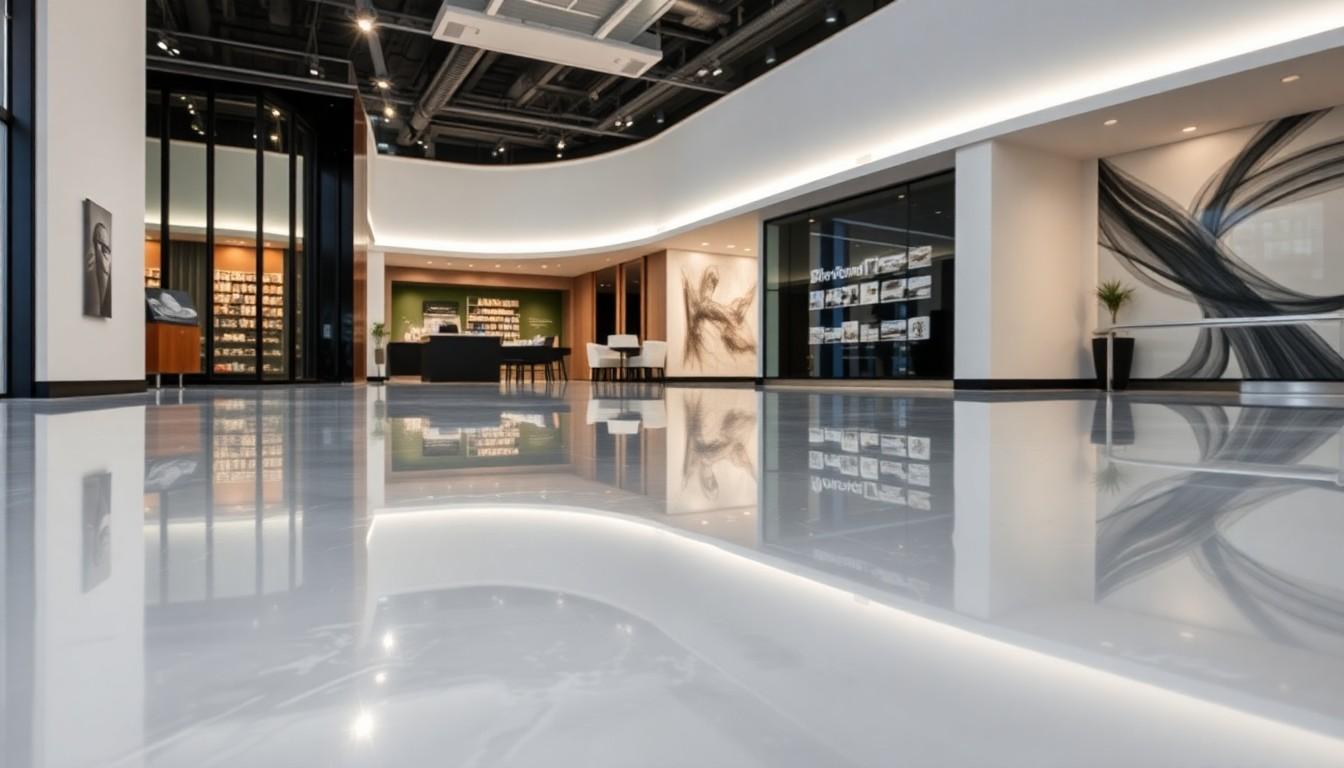
Epoxy flooring offers exceptional advantages for both commercial and residential properties throughout London. Its unique properties address many challenges faced by property owners in this bustling metropolis.
Durability in High-Traffic Areas
Epoxy flooring excels in high-traffic environments common throughout London’s commercial districts. These floors last 5-10 years in commercial settings and even longer in residential areas, making them a cost-effective long-term investment. The impact and abrasion resistance of epoxy floors proves particularly valuable in busy London retail spaces, warehouses, and industrial facilities where foot traffic and equipment movement occur constantly.
The chemical resistance properties of epoxy flooring protect against oil stains, chemical spills, and corrosive substances. This makes it perfect for London’s automotive workshops, commercial kitchens, and industrial sites where spills happen regularly. In population-dense areas like Islington, where traditional concrete floors quickly become scuffed and unsightly, epoxy provides sustained performance without frequent replacement.
Weather Resistance for London’s Climate
London’s notoriously damp climate poses challenges for many flooring options, but epoxy flooring thrives in these conditions. The seamless, waterproof surface prevents moisture penetration common in the city’s rainy seasons. This waterproof barrier protects underlying concrete from freeze-thaw damage during London’s winter months.
For areas such as walk-in fridges, cold stores, and loading bays, special cold-cure epoxy formulations can be applied at temperatures down to -10°C. This ensures installation flexibility year-round, regardless of London’s variable weather patterns. The thermal stability of epoxy flooring means it won’t expand or contract significantly with temperature fluctuations, maintaining its integrity through seasonal changes.
Aesthetic Versatility
Epoxy flooring transforms London spaces with its remarkable design flexibility. The high-gloss finishes create contemporary sophistication in both residential garages and commercial showrooms. With customisable colours and textures, property owners can align their flooring with existing décor or brand identity.
For retail spaces and upscale residential properties in London, decorative epoxy options offer striking visual appeal with custom designs. The smooth, continuous surface creates a modern aesthetic that complements London’s blend of historic and contemporary architecture. The reflective quality of high-gloss epoxy can also enhance lighting, making smaller London spaces appear larger and brighter—a valuable feature in the city’s compact buildings.
The Installation Process
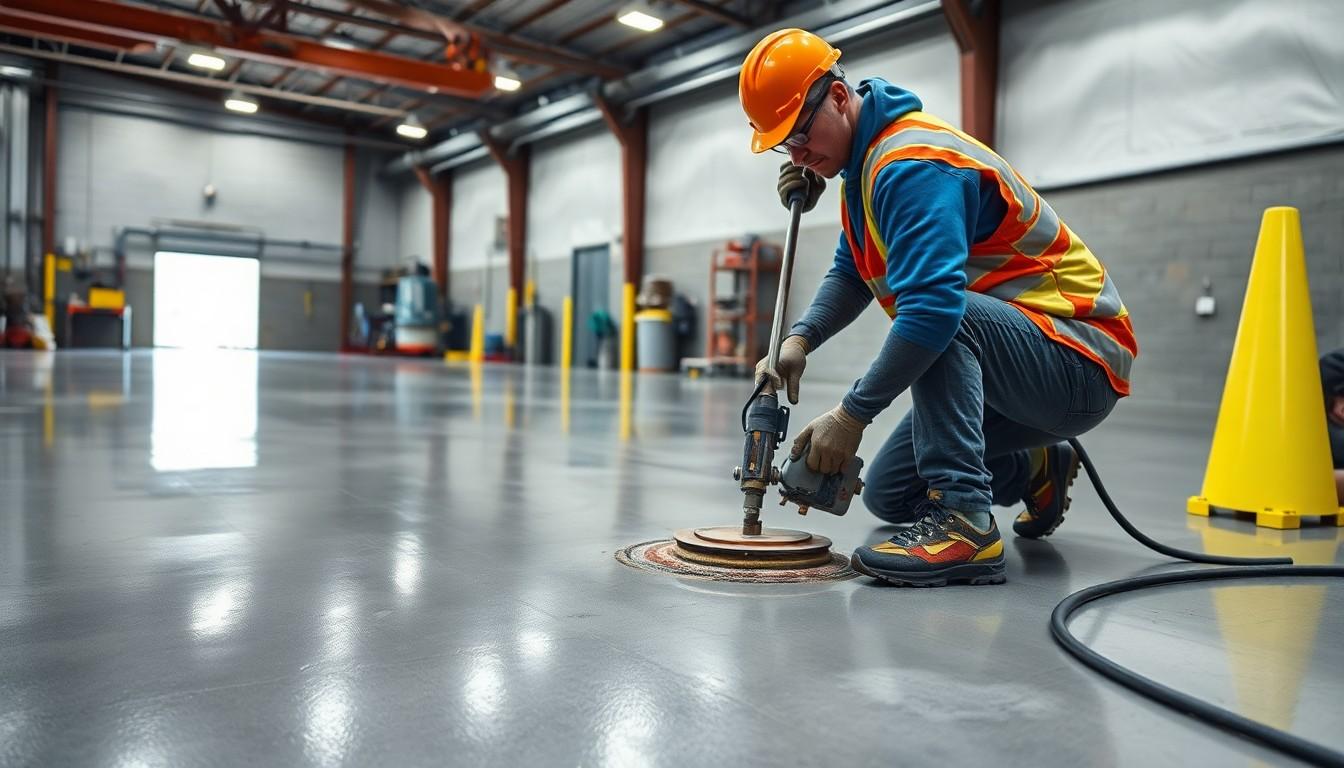
The installation process of epoxy flooring in London involves several crucial steps to ensure a durable, high-quality finish. Professional installers follow specific techniques that guarantee optimal adhesion and longevity of your epoxy floor.
Surface Preparation
Surface preparation forms the foundation of successful epoxy flooring installation. Proper preparation involves removing all items from the installation area to create a clear workspace. Diamond grinding is then used to strip the top smooth layer of concrete, exposing the aggregate underneath for better adhesion. This critical step ensures the epoxy bonds properly with the existing substrate.
After grinding, thorough cleaning removes all dirt, debris, and contaminants such as grease or oil from the surface. Vacuuming the area eliminates dust particles that could compromise the finish. Any cracks or divots in the floor are patched using fast epoxy repair mortar to create a smooth, uniform surface. Finally, a moisture barrier primer is applied to prevent moisture from interfering with the epoxy bond—a particularly important consideration in London’s damp climate.
Application Techniques
Application techniques vary depending on the type of epoxy system being installed. The process typically begins with mixing the epoxy resin and hardener according to manufacturer specifications. Timing is essential, as the mixture has a limited working time before it begins to cure.
For standard installations, professionals use specialised rollers to apply the base coat evenly across the prepared surface. Spike shoes are worn to walk on wet epoxy without disturbing the finish. Many London installations include decorative elements such as colour flakes or metallic pigments, which are broadcast onto the wet base coat. Once partially cured, excess decorative elements are removed, and a clear topcoat is applied to seal the system and provide additional protection.
High-traffic commercial spaces in London often receive multiple coats of epoxy for enhanced durability. The application must be completed in sections with careful attention to maintain a wet edge, preventing visible lap marks in the finished floor.
Curing Time
Curing time varies based on several factors including temperature, humidity, and the specific epoxy formulation used. In London’s climate, standard epoxy systems typically require 24-48 hours before light foot traffic is permitted. Full curing, which allows for vehicle traffic or furniture placement, generally takes 5-7 days.
Environmental conditions significantly impact curing times. During colder months, special cold-cure formulations may be used, though these still require temperatures above 10°C for proper curing. Adequate ventilation is maintained throughout the curing process to remove fumes and promote proper hardening.
Professional installers provide specific aftercare instructions for your London property, including when to resume normal use of the space. Rushing this process by placing heavy items on partially cured epoxy can result in permanent damage, making patience during this final installation phase essential for achieving a long-lasting, beautiful finish.
Cost Considerations for Epoxy Flooring in London
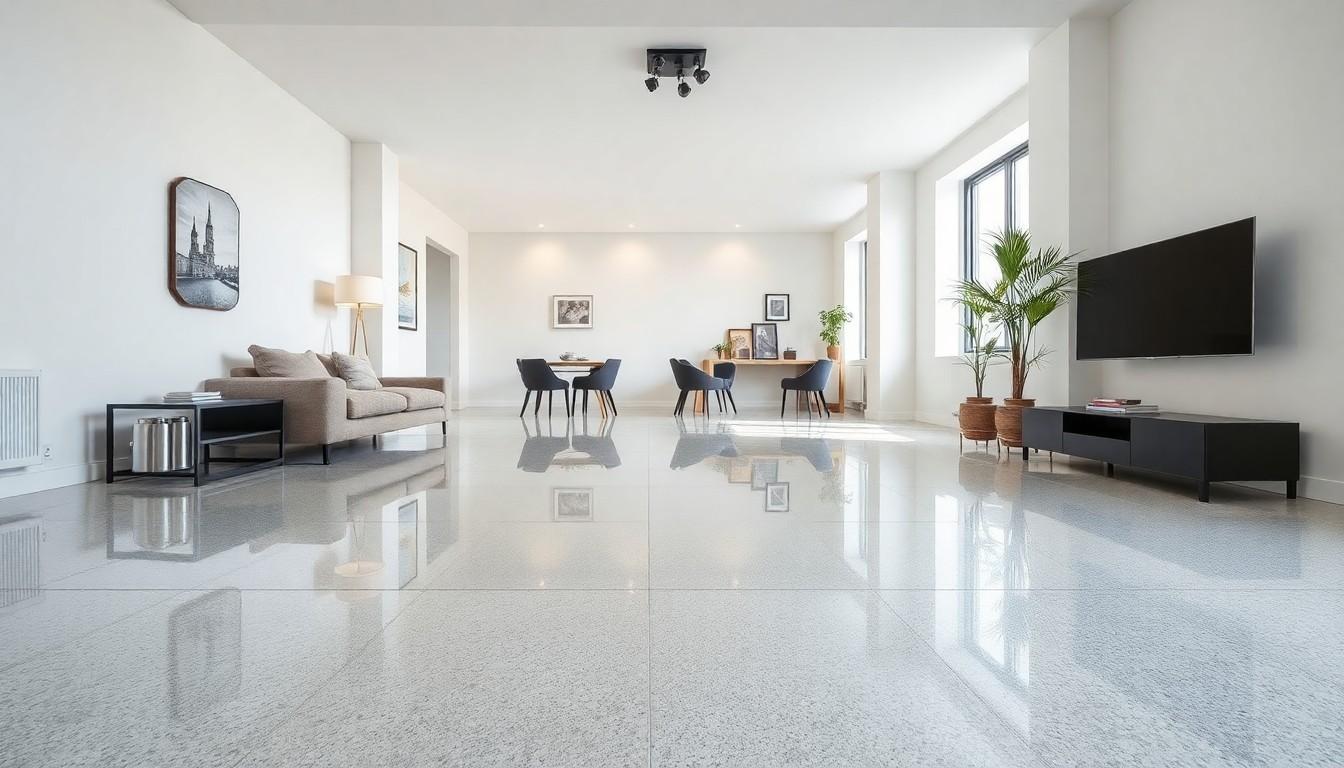
Epoxy flooring in London involves various cost factors that impact the overall investment. Understanding these costs helps homeowners and commercial property owners make informed decisions when planning their flooring projects.
Factors Affecting Price
The cost of epoxy flooring in London varies based on several key factors. Material quality significantly impacts pricing, with water-based epoxy systems starting at £25-£45 per square metre, while high-end decorative options can reach £75-£150 per square metre. System complexity also affects cost—solvent-based epoxy ranges from £35-£65 per square metre, and 100% solid epoxy systems cost between £55-£90 per square metre.
Labour costs in London are among the highest in the UK, ranging from £250 to £350 per day, adding approximately £15-£35 per square metre to your project. Surface preparation represents another substantial expense, adding £15-£30 per square metre depending on your existing floor’s condition. This preparation often includes concrete repairs, surface levelling, moisture barrier installation, and deep cleaning.
Floor size directly impacts the total cost, with larger areas typically benefiting from economies of scale. Project complexity, including custom designs, multiple colours, or special finishes, increases both material and labour expenses. The location within London affects pricing as well, with central London projects often commanding premium rates compared to outer boroughs.
Long-Term Value Analysis
Epoxy flooring offers excellent long-term value even though its initial cost. The durability of epoxy systems translates to fewer replacements over time—commercial applications typically last 5-10 years before needing refreshing, while residential installations often exceed this lifespan with proper maintenance.
Maintenance costs for epoxy floors are minimal compared to alternative flooring options. The seamless, non-porous surface requires only regular sweeping and occasional mopping, eliminating expenses for specialized cleaning products or equipment. This easy-care nature makes epoxy particularly valuable in London’s urban environment, where dust and pollution can quickly affect flooring surfaces.
Energy efficiency represents another long-term benefit. The reflective properties of high-gloss epoxy flooring improve interior lighting efficiency, potentially reducing electricity costs in both commercial and residential settings. For businesses, this translates to lower operational expenses over the floor’s lifetime.
Property value enhancement provides additional return on investment. Well-installed epoxy flooring adds to a property’s marketability in London’s competitive real estate market. The modern aesthetic and practical benefits appeal to buyers and tenants alike, potentially increasing rental or resale values beyond the initial installation cost.
When comparing epoxy to alternative flooring options like tile, hardwood, or carpet, the total lifecycle cost often favours epoxy. While the upfront investment may be higher than some options, the extended lifespan and reduced maintenance requirements typically result in lower costs over 10-15 years of ownership.
Maintenance and Care for Epoxy Floors
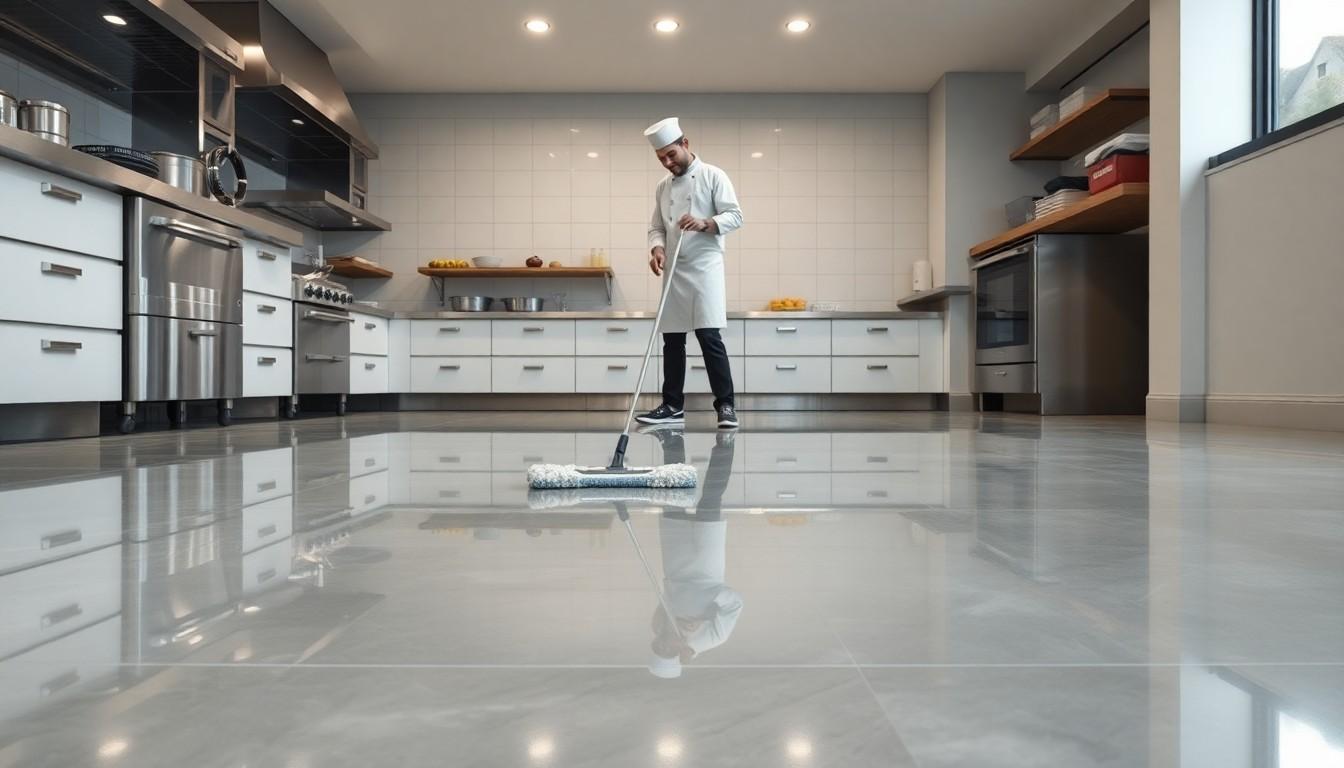
Epoxy floors offer exceptional durability and aesthetic appeal, yet proper maintenance ensures they remain in pristine condition for years. London’s unique climate and urban environment require specific care approaches to preserve your epoxy flooring investment.
Daily and Weekly Cleaning
Daily cleaning of epoxy floors prevents surface damage and maintains their glossy appearance. Sweep or dry mop your floors daily using a soft-bristled indoor broom or dust mop to remove loose particles that might scratch the surface. This simple routine extends the life of your epoxy floors by preventing abrasive wear from dirt and debris.
For weekly maintenance, use a damp mop with warm water and a pH-neutral cleaner specifically formulated for epoxy floors. Avoid soap-based products and strong detergents as they leave residue that dulls the high-gloss finish. A foam mop or microfiber mop works best for this purpose, and rinsing the mop frequently prevents redistributing dirt across your clean floor.
Cleaning Agents and Methods
Selecting the right cleaning products protects your epoxy floor’s integrity and appearance. Use non-ammonia-based cleaners diluted with warm water for regular cleaning. Products like Simple Green, when properly diluted, provide effective cleaning without damaging the epoxy resin.
Avoid using cleaning agents containing acids, solvents, or citrus bases as these ingredients erode the epoxy resin over time. In London’s commercial environments such as automotive workshops or food preparation areas, where spills are common, prompt cleaning with appropriate products preserves the floor’s chemical resistance and prevents staining.
The seamless nature of epoxy flooring makes cleaning straightforward compared to other flooring types. Without joints or crevices where dirt can accumulate, a properly maintained epoxy floor in London remains hygienic and attractive with minimal effort, making it particularly valuable in healthcare facilities, commercial kitchens, and industrial settings where cleanliness is paramount.
Popular Applications Across London
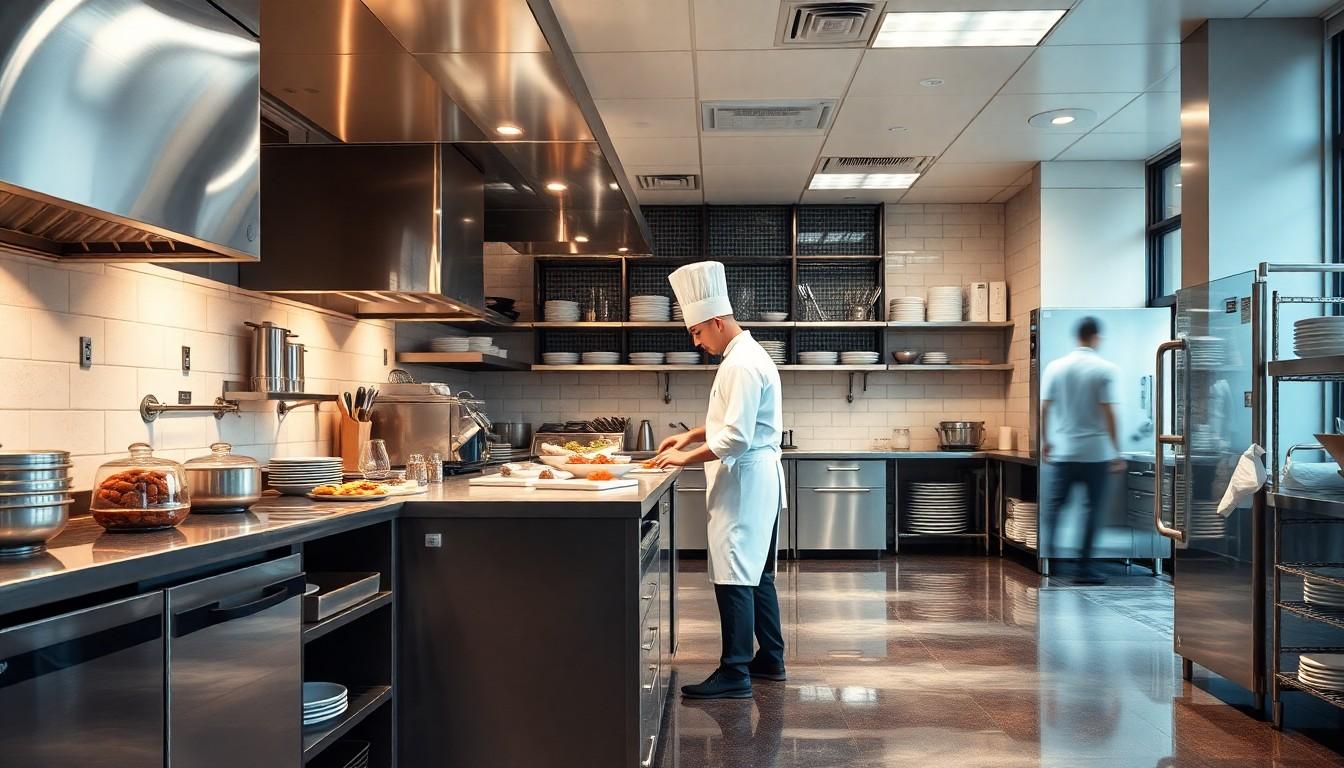
Epoxy flooring has gained significant popularity across London due to its versatility and durability. This robust flooring solution serves various sectors throughout the capital, meeting the demanding requirements of different environments while providing exceptional performance advantages.
Commercial Establishments
Commercial properties across London benefit tremendously from epoxy flooring installations. The exceptional durability of epoxy floors makes them ideal for high-traffic retail spaces, shopping centres, and office buildings where footfall causes substantial wear. Many commercial kitchens and restaurants in London utilise epoxy flooring for its chemical and spill resistance, protecting concrete from damage caused by water, cleaning products, grease, and oils.
Healthcare facilities and pharmaceutical companies in London choose epoxy flooring for its seamless, non-porous surface that prevents bacterial growth and simplifies sterilisation procedures. For hospitality businesses such as hotels and pubs, epoxy flooring provides an attractive, easy-to-maintain surface that withstands constant foot traffic while offering slip-resistant options for wet areas like bathrooms and kitchen spaces.
Retail stores in Knightsbridge and Oxford Street incorporate decorative epoxy systems with metallic finishes or custom branding elements, creating distinctive shopping environments while maintaining practicality and longevity.
Residential Properties
London homeowners increasingly turn to epoxy flooring for various residential applications. Garage floors remain the most common residential application, with epoxy providing protection against oil stains, tyre marks, and general wear. The waterproof nature of epoxy flooring makes it particularly suitable for London’s basements, protecting against the city’s high water table and occasional flooding risks.
Contemporary London apartments feature epoxy flooring in living areas, offering a modern aesthetic with seamless, high-gloss finishes that reflect natural light—a valuable quality in London’s often dim weather conditions. Bathroom installations benefit from epoxy’s waterproof properties, with specialised anti-slip formulations ensuring safety in wet conditions.
In Victorian terrace conversions across Islington and Camden, epoxy flooring provides a practical solution for updating uneven concrete subfloors while preserving the character of these historic properties. Many London homeowners choose metallic epoxy finishes for home offices and entertainment areas, creating distinctive spaces with depth and visual interest.
Industrial Settings
Industrial facilities throughout London rely on epoxy flooring for its exceptional performance characteristics. Manufacturing plants in Park Royal and other industrial zones utilise heavy-duty epoxy systems capable of supporting machinery weight and resisting impact damage from dropped tools and equipment.
Warehouses and distribution centres across Greater London benefit from epoxy’s ability to withstand continuous traffic from forklifts and pallet jacks while maintaining clear line markings for safety and organisational purposes. Automotive workshops in East London apply chemical-resistant epoxy flooring that protects against oil, fuel, and solvent exposure while providing a professional appearance.
Food processing facilities carry out HACCP-compliant epoxy systems that meet strict hygiene regulations while withstanding frequent cleaning with harsh chemicals. In pharmaceutical manufacturing facilities, static-dissipative epoxy flooring prevents potentially dangerous static electricity build-up in environments where sensitive electronic equipment or flammable materials are present.
Scientific laboratories throughout London’s research institutions choose epoxy flooring for its chemical resistance properties and easy decontamination, with special formulations available to withstand specific acids and research chemicals used in various scientific disciplines.
Conclusion
Epoxy flooring stands as the premier flooring solution for London properties seeking durability aesthetic appeal and practical benefits. Whether you’re upgrading your residential garage or revamping a commercial space you’ll enjoy remarkable longevity with minimal maintenance requirements.
The investment delivers exceptional value over time especially considering London’s challenging climate and high property standards. From seamless installation to customisable finishes epoxy adapts to your specific needs while enhancing your property’s value.
Ready to transform your space? Professional installation ensures optimal results tailored to London’s unique environmental conditions. With options ranging from standard systems to decorative finishes epoxy flooring offers the perfect balance of functionality and style for any London property.
Frequently Asked Questions
What is epoxy flooring and how is it made?
Epoxy flooring is a durable surface coating made from epoxy resin and a hardener. When these components are mixed, they create a chemical reaction that forms a rigid plastic material with strong bonds. This results in a seamless, high-performance floor covering that adheres firmly to properly prepared concrete surfaces, creating a robust finish ideal for both commercial and residential applications in London.
How long does epoxy flooring last in London properties?
Epoxy flooring in London typically lasts 5-10 years in high-traffic commercial settings and 10-20 years in residential spaces. Its exceptional durability significantly outperforms painted concrete floors, which chip and wear quickly. The longevity depends on proper installation, quality of materials used, and maintenance practices. In London’s climate, specially formulated epoxy systems help ensure maximum lifespan despite temperature and humidity fluctuations.
Is epoxy flooring suitable for London’s damp climate?
Absolutely. Epoxy flooring is particularly well-suited for London’s damp climate due to its seamless, waterproof characteristics. When properly installed, it creates an impermeable barrier that prevents moisture penetration and subsequent damage to the underlying concrete. The moisture barrier primers used during installation further protect against London’s high humidity levels, preventing issues like delamination and mould growth that affect other flooring types.
What maintenance does epoxy flooring require?
Epoxy flooring requires minimal maintenance, making it ideal for busy London properties. Daily sweeping with a soft broom removes abrasive particles, while weekly mopping with a pH-neutral cleaner keeps the surface pristine. Avoid acidic or solvent-based cleaners that can damage the finish. Spills should be promptly wiped up, though the surface is resistant to most stains. Professional resealing every 3-5 years helps maintain the flooring’s appearance and protective qualities.
How much does epoxy flooring cost in London?
Epoxy flooring in London typically costs £25-£45 per square metre for standard water-based systems and up to £75-£150 per square metre for high-end decorative options. Pricing varies based on material quality, system complexity, surface preparation requirements, and labour costs. While the initial investment exceeds some alternatives, the extended lifespan and minimal maintenance requirements typically result in lower overall costs over time, offering excellent long-term value.
Is epoxy flooring suitable for garage floors?
Epoxy flooring is exceptionally well-suited for London garage floors. Its durability withstands heavy vehicle traffic, while its chemical resistance protects against oil, fuel, and automotive fluid spills. The seamless surface makes cleaning simple, an important feature in London’s often dusty urban environment. Additionally, the high-gloss finish brightens garage spaces, and customisable colour options allow homeowners to create an attractive extension of their living space rather than merely a storage area.
How long does installation take, including curing time?
The complete epoxy flooring installation process in London typically takes 3-5 days. Surface preparation requires 1-2 days, depending on the concrete’s condition. Application takes 1 day for standard systems and up to 2 days for decorative options. Curing times follow, with light foot traffic possible after 24-48 hours and full curing in 5-7 days. London’s humidity and temperature conditions may extend these timeframes, particularly in colder months.
Can epoxy flooring be installed in commercial spaces without disrupting business?
Yes, with proper planning. Many London installation specialists offer weekend or out-of-hours services to minimise business disruption. For retail and hospitality venues, sectional installation allows portions of the space to remain operational. Fast-curing formulations can reduce downtime, with some areas usable within 24 hours. However, complete curing still requires 5-7 days for optimal durability, so scheduling during quieter business periods is recommended.
What colour and design options are available for epoxy flooring?
Epoxy flooring offers extensive customisation options for London properties. Solid colours range from subtle neutrals to bold statements, while metallic epoxies create dramatic, three-dimensional effects popular in contemporary spaces. Flake systems provide terrazzo-like finishes with excellent slip resistance. Custom patterns, logos, and even photographic images can be incorporated for unique branding in commercial environments. The high-gloss finish enhances colours and can make London’s typically smaller spaces appear larger.
Does epoxy flooring add value to London properties?
Yes, epoxy flooring can increase London property values by up to 5%. In London’s competitive real estate market, the sleek, modern appearance appeals to buyers and tenants alike. The low-maintenance requirements are particularly attractive in busy urban lifestyles. For commercial properties, the professional appearance and durability represent significant value. In residential settings, well-installed epoxy flooring in garages and basements transforms underutilised spaces into valuable assets.


